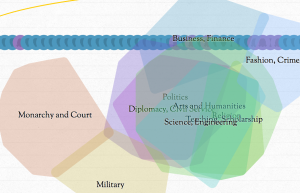Stéfan Sinclair invited me to a half-day conference and lunchy that closed his LLCU-602: Digital Humanities – New Approaches to Scholarship course. You can see my conference notes at Grad Student Mini-Conference On The Digital Humanities. At lunch while the others were eating I was asked to talk about careers in the digital humanities. My talk was on “Thinking Through” as a practice in the humanities that is open to the digital. I started by talking about the recent Von Trotta film about Hannah Arendt which presents Arendt as an uncompromising advocate for thinking for oneself. I tried to spin out how one might think for oneself through the epochal interactive matter we have before us.
What I didn’t have time to argue was how thinking through is for me an alternative way of characterizing what we do in the digital humanities. It is an alternative, on the one hand, to Willard McCarty’s argument for modeling (as the model, so to speak), and Matt Kirchenbaum’s argument that for the digital humanities “as/is” tactical.
My argument suffers from some of the same problems that Fish finds in Ramsay’s work (in whose company I quite happy to be); namely that I find the digital humanities both to be an extension of existing humanistic ways of thinking and also a new way. I tried to show how it is simultaneously an old way of thinking and a new one. What has changed is the matter(s) we think through and the dangers we ford. The new matters are the digital evidence and computing affordances. The new dangers are the discourses of efficiency and instrumentality.
